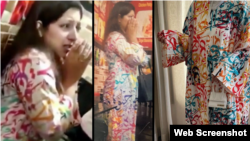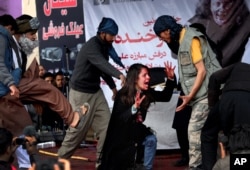On February 26, an angry group of some 300 men gathered outside a restaurant in Pakistan’s capital Lahore, where a woman was seen wearing an outfit made with a fabric with imprinted Arabic calligraphy.
The mob surrounded the woman threatening to harm her physically and even kill her for offending the Muslim religion by wearing a dress with Quranic verses:
"This woman has disrespected the Quran. She did it with purpose," mobsters shouted.
That is false.
While the woman’s dress was adorned with Arabic calligraphy, there were no Quran verses on her outfit.
In fact, the dress had only one Arabic word printed on its fabric: - "حلوة", or "Halwa", meaning "beautiful."
Notably, the Islamist mob was ignorant of the Arabic language and the Quran as nobody in the crowd showed signs of understanding what was written on her dress, let alone distinguishing a common Arabic word from the Quranic verses.
A female police officer intervened and led the victim to safety.
On X, users pointed out that the mob, while ignorant of the Arabic language, was calling for an extrajudicial execution, with many in the incident video heard shouting “Behead her!”
Pakistan’s blasphemy law states that any “derogatory remarks” about the “Holy Quran and the Prophet [Muhammad] either spoken or written, or by visible representation, or by any imputation, innuendo or insinuation, directly or indirectly shall be punished with death, or imprisonment for life, and shall also be liable to fine.”
Pakistani journalist in exile Taha Siddiqui shared on X a video, which appears to be recorded inside the police station. It shows what seems to be the police mediating “peace negotiations” between the victim and her attackers.
In the video, the female police officer who secured the victim, tells on the camera a brief version of the events, explaining that the woman went out shopping together with her husband "wearing a Kurta with Arabic,” which led to people asking her to remove the dress and “caused the confusion.”
The officer then introduces the men standing next to her as the people “who were at that place,” and that “Naeem will explain what happened,” calling one of them by name.
In a comment to the video, Siddiqui says the men in the video are the same “Islamists who accused her of blasphemy.”
The man identified as Nadeem, speaking in Urdu, says that the victim’s outfit was fine, but the design was not, and that is why the “crowd talked about it.” He then says that the victim “apologized for her dress and would never wear anything like that ever again.”
The camera moves to the victim, now wrapped in loose clothes, with only her eyes and palms exposed and no sign of her “blasphemy dress.”
Sitting between two men, one of whom seems to be telling her what to say, the woman starts with an Islamic greeting and states that she comes from a Muslim family.
She then goes on, taking the blame for being attacked and repeatedly apologizing: “...whatever happened was because of my lack of knowledge. I had no such intentions... I still beg for forgiveness... This will never happen again.”
Canadian human rights activist Yasmine Mohammed, author of the book "Unveiled: How the Western Liberals Empowered Radical Islam," reposted the apology video On February 26, and commented:
“In Pakistan if you’re a woman attacked by a mob of illiterate men, you must apologize to them.”
Yet this Pakistani woman was lucky.
A mob beat and killed a 27-year-old woman Farkhunda Malikzada in 2015 in Kabul, Afghanistan, falsely accusing her of burning the Quran.
Two days after her death, Afghanistan’s Ministry of Hajj and Religious Affairs declared her innocent, stating that she had not burned the Quran.
The New York Times published a dramatic video chronicling Malikzada’s death compiled from the mobile phone footage the mobsters and bystanders shot while beating their victim.
The Indian news site OpIndia reported that in Kuwait, a predominantly Muslim country, where outfits with Arabic calligraphy are originally designed, such dresses are being sold with no issues, and women wearing them have been appearing in public for almost a year.
Responding to the incident in Lahore, the fashion company Semplicta’s stated on Instagram [sic]: “Dear pakistani people We have nothing to do with the recent incident that happened to the innocent girl We are based in kuwait company And we do NOT ship worldwide Please stop following and messaging since its really disturbing We use arabic words and letters in different fonts everywhere since its our language!”







